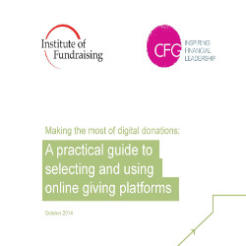The Institute of Fundraising and Charity Finance Group have launched a free guide to selecting and using online giving platforms.
The guide, Making the most of digital donations, which can be downloaded from the organisations’ websites, was produced with support and in collaboration with the accountancy firm Crowe Clark Whitehill.
The guide aims to help charities understand how online giving platforms, which include well-known sites like JustGiving and BT Donate, work and explains key issues to think about when choosing which ones to use when fundraising. It also provides due diligence checks that charities should be aware of when choosing an online giving platform.
Pesh Framjee, head of not-for-profits at CCW, was appointed interim manager of the Dove Trust in June last year by the Charity Commission following concerns about the management of the online giving platform CharityGIving, which was later suspended in order to protect funds raised through the site.
Following the suspension of CharityGiving, the IoF said it would produce guidance for charities and fundraisers about online giving platforms.
Questions about due diligence highlighted by the guide include considering how much is known about the online platform provider, what its reputation is like, does it have recommendations from other charities, how long has it been trading, is it backed by a larger commercial organisation or is it a smaller company with limited back up finances if something goes wrong?
The guide says it is important to consider what controls are in place for looking after the money donated and raised through the site.
It says there have been cases where organisations raising and/or holding funds for charities have defaulted on their obligations. In some of these cases charities were protected and in others they have lost funds as the arrangement were not adequate to ensure the security of funds.
The guide highlights a recent case where simple due diligence of checking the Charity Commission’s website would have shown that the charity provider had not filed audited accounts for a number of years.
The Commission first received a complaint about the Dove Trust in 2011 about a delayed payment to a charity and that it had not submitted accounts since 2006.
In the case of the Dove Trust, the High Court ruled in July that the available funds should be distributed between the 1,812 charities and good causes in proportion to the amount they are owed. Framjee has said the money, £709,529 of the £1.68m owed, would start to be distributed by this month.
The guide also says charities should review their ethical policies to ensure there are no conflicts of interest between them and the provider. If the website carries third party advertising, charities should find out what controls are in place to check that any ads that appear on a charity’s page are appropriate to its audience, and it is comfortable being associated with the company.
As well as due diligence and security considerations, the guide includes sections on how to assess the right method of taking donations via a third party site, best practice tips and case studies.
Peter Lewis, chief executive of the Institute, said: “Online giving continues to grow rapidly. As the market continues to expand it is important that our members, and all charity fundraisers, feel confident in understanding how online giving platforms work so that they can make an informed decision about which ones they want to use. We hope that this guide will help charities engage with online platforms and enable them to fundraise most effectively.”
Caron Bradshaw, chief executive of CFG, said: “We hope that the guide encourages those responsible for finance and fundraising in charities to work closely together to have an informed conversation about the considerations and needs of their organisation when making their assessment of all the options available.”









